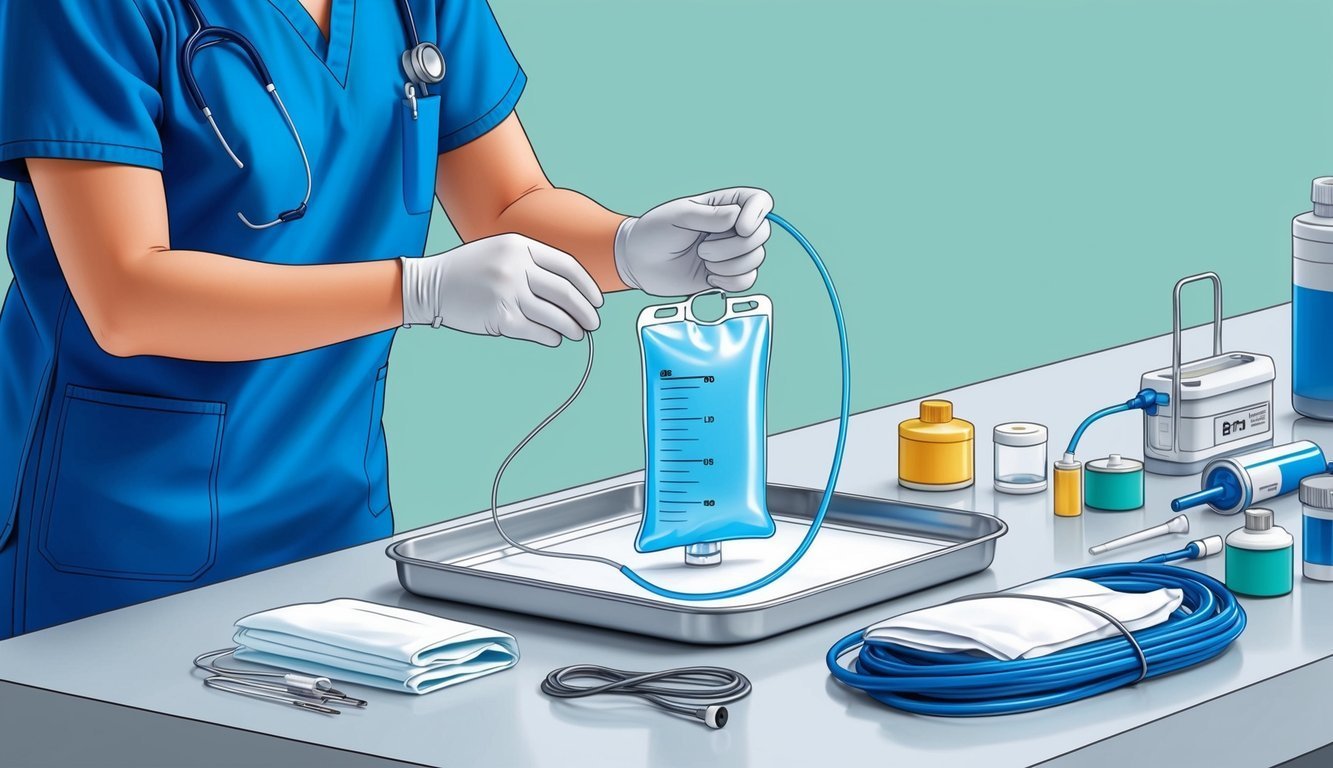Becoming an IV nurse is a rewarding career choice for those interested in specialized patient care.
First, you must earn your registered nursing (RN) license and gain experience in the nursing field.
This role focuses on administering intravenous therapy and requires a deep understanding of patient needs and technical skills.
As you navigate your nursing education, you will learn about necessary competencies and clinical skills crucial for IV therapy.
Certification can enhance your career prospects and showcase your expertise in this critical area of nursing care.
With a growing demand for skilled healthcare professionals, now is a great time to explore this career path.
Key Takeaways
- You need to become a registered nurse before specializing in IV therapy.
- Gaining hands-on experience is essential for developing core nursing skills.
- Certification can lead to better job opportunities and career advancement.
Understanding the Role of an Infusion Nurse
As an infusion nurse, you play a crucial role in delivering specialized care through various infusion therapies.
This involves administering medications and fluids through intravenous (IV) lines, ensuring patient safety and comfort in different settings.
Infusion Therapy and Its Applications
Infusion therapy involves delivering fluids, medications, or nutrients directly into a patient’s bloodstream.
This method allows for rapid action, making it essential in various treatments, including:
- Chemotherapy: Administering cancer treatments through IV helps manage side effects effectively.
- Blood Transfusions: You monitor patients receiving blood products, ensuring safety and compliance with protocols.
- Intravenous Medications: You deliver antibiotics, pain relief, and other necessary drugs through IV lines.
Your understanding of the specific medications and their interactions is vital for ensuring optimal patient care.
Different Types of Infusion Therapies
Infusion therapies can be categorized into several types based on the patient’s needs:
| Therapy Type | Description |
|---|---|
| Vitamin Infusions | Nutrients directly into the bloodstream to address deficiencies. |
| Home Infusion | Patients receive IV therapy at home, requiring you to educate them on care and safety. |
| Outpatient Infusion | Administering treatments in settings like infusion centers, allowing patients to go home after. |
Each type requires you to adapt your techniques and patient interactions to provide effective care.
Work Settings of Infusion Nurses
Infusion nurses work in a variety of settings, each with unique demands:
- Hospitals: You may work in emergency departments, oncology units, or dedicated infusion therapy units.
- Infusion Centers: These facilities focus exclusively on providing infusion therapy, requiring you to manage multiple patients simultaneously.
- Home Care: You provide education and support for patients and their families on managing home IV treatments.
Your role can vary significantly across these settings, impacting the way you interact with patients and administer therapies.
Educational Pathways to Become an Infusion Nurse

To become an infusion nurse, you must follow specific educational pathways.
This involves obtaining the necessary nursing degrees and pursuing various specializations and certifications to enhance your skills in intravenous therapy.
Nursing Degrees and Programs
Your journey begins with earning a nursing degree.
There are two main options: the Associate Degree in Nursing (ADN) and the Bachelor of Science in Nursing (BSN).
-
ADN: Typically a two-year program that prepares you for the NCLEX-RN exam. This option can lead to entry-level nursing positions, including IV therapy roles.
-
BSN: A four-year degree that offers a broader education. It often includes management and leadership training, which can be beneficial for career advancement.
Many registered nurses pursue RN-to-BSN programs while working to further their education.
Completing either degree allows you to become a licensed registered nurse, opening doors to various specialty roles, including infusion nursing.
Specializations and Certifications
After obtaining your nursing degree, gaining experience in clinical settings is crucial.
Look for positions that provide IV therapy training.
You can also pursue certifications such as the Certified Registered Nurse Infusion (CRNI).
This certification demonstrates your expertise in infusion therapy, covering medication administration and patient safety.
Continuing education opportunities can further enhance your skills and knowledge.
Seek out workshops and seminars focused on infusion practices.
Staying up-to-date with the latest techniques is essential for success in this specialty.
Core Competencies and Clinical Skills
As an IV nurse, you need a strong foundation in various competencies and clinical skills.
This includes understanding patient care, managing equipment, and ensuring safety during procedures.
Patient Assessments and Care Planning
Patient assessments are crucial in determining the best course of action for IV therapy.
You should start by gathering vital signs and reviewing medical history.
This will help identify any potential allergies to medications or IV solutions.
Create a care plan tailored to each patient’s needs.
This includes setting goals and defining the expected outcomes of the IV therapy.
Regular monitoring is essential to adjust the plan based on the patient’s response.
Effective patient education on the procedure will also enhance compliance and reduce anxiety.
Managing Infusion Equipment and Medications
It’s vital to understand the various types of infusion equipment.
This includes programmable infusion pumps, syringes, and IV bags.
Regularly inspect your equipment to ensure it’s functioning correctly.
When administering medications, be aware of pharmacology principles.
Know the dosage, potential side effects, and interactions with other drugs.
Proper venipuncture techniques are necessary to establish vascular access without complications.
Always follow the “rights” of medication administration: the right patient, medication, dose, route, and time.
Infection Control and Patient Safety
Infection prevention is a key responsibility.
Follow strict hand hygiene protocols before and after patient contact.
Use personal protective equipment (PPE) as needed.
Implement strategies such as using aseptic techniques during catheter insertion.
Regularly change IV sites and dressings to prevent infections.
Educate your patients on recognizing signs of infection, such as redness or swelling at the insertion site.
This vigilance helps maintain patient safety and enhances care quality.
Certification and Advancement in Infusion Nursing
To enhance your career as an IV nurse, obtaining certification and engaging in ongoing professional development are crucial steps.
These actions not only improve your skills but also increase your job opportunities and earning potential.
Obtaining CRNI Certification
To become a Certified Registered Nurse Infusion (CRNI), you must meet specific requirements.
First, you should be a registered nurse with a valid license.
Then, you need to accumulate at least 1,600 hours in infusion nursing practice over the last two years.
The CRNI certification exam covers various topics in infusion therapy, including drug administration, patient safety, and infection control.
You can find more details and resources for preparation through the Infusion Nurses Certification Corporation.
Becoming certified shows your commitment to high-quality patient care and enhances your credibility in the field.
This certification is valid for four years, after which you will need to renew it by completing continuing education hours.
Continuing Professional Development
Continuing education is vital for maintaining your skills and staying updated in infusion nursing.
You can fulfill this requirement through courses, workshops, and webinars offered by various organizations, including the American Nurses Association.
Many programs focus on advanced IV therapy techniques, new medications, and developments in infusion services.
Regularly engaging in these educational activities can enhance your expertise and ensure you provide the best care for your patients.
Consider pursuing advanced nursing degrees, which can open doors to leadership roles in infusion therapy.
These options may include Master’s or Doctorate programs, which provide further insight into specialized practices and research methodologies.
Employment Outlook and Advancing Your Career
The demand for IV nurses is growing, reflecting the need for specialized care in various healthcare settings.
Understanding job market trends and salary expectations, as well as leveraging professional networks, will help you advance your career in this field.
Job Market and Salary Expectations
The job outlook for infusion nurses is strong, driven by an increasing emphasis on patient-centered care and specialized treatments.
According to salary data, the average annual salary for infusion nurses is around $91,466, although it can vary based on geographical location and healthcare organization.
| Location | Average Salary |
|---|---|
| California | $102,000 |
| Texas | $85,000 |
| New York | $95,000 |
| Florida | $81,000 |
To become an infusion nurse, you need to hold an active nursing license and gain specialized training.
Many nurses enhance their qualifications through certification programs, like those offered by the Infusion Nurses Society (INS).
Working in different settings, such as hospitals, clinics, or home health environments, can also influence your salary and career growth.
Professional Networks and Associations
Joining professional networks and associations can be key to advancing your career.
Organizations like the National Home Infusion Association and the Infusion Nurses Society (INS) provide resources, continuing education, and networking opportunities.
Connecting with other professionals in your field can offer insights into new job openings and industry trends.
Attending conferences or local chapter meetings can enhance your professional visibility.
Engaging in these networks can also improve your patient outcomes by allowing you to learn best practices and innovative techniques directly from experienced colleagues.
Frequently Asked Questions

Many nurses have questions about becoming an IV nurse.
The following sections provide clear answers to common inquiries regarding education, salary, certifications, and training programs.
What are the educational requirements for becoming an IV nurse?
To become an IV nurse, you need a nursing degree.
You can choose between an Associate Degree in Nursing (ADN) or a Bachelor of Science in Nursing (BSN).
While an ADN is the minimum requirement, most employers prefer a BSN for better job opportunities.
What is the average salary for an IV nurse?
The average salary for an IV nurse can vary based on factors like location and experience.
Generally, infusion nurses earn competitive wages, often ranging from $60,000 to $90,000 per year.
For more detailed salary information, you can check salary data.
What certifications are required for an IV therapy nurse?
Certification is important for IV therapy nurses.
You will typically need Basic Life Support (BLS) certification.
Many nurses also pursue the Certified Registered Nurse Infusion (CRNI) certification to enhance their credentials.
This certification demonstrates your expertise in infusion therapy.
How long does it take to become a certified infusion nurse?
The time it takes to become a certified infusion nurse can vary.
After obtaining your nursing degree, gaining relevant experience in IV therapy is necessary.
The certification process itself usually takes a few weeks to study for and pass the exam once you meet the required experience.
What is the scope of practice for LPNs in infusion nursing?
Licensed Practical Nurses (LPNs) can perform many tasks in infusion nursing, but their scope of practice is more limited than that of registered nurses (RNs).
LPNs may assist with IV therapy under the supervision of an RN.
Always check your state’s regulations for specific duties.
Are there any special training programs for nurses who want to specialize in IV therapy?
Yes, there are special training programs for nurses interested in IV therapy.
Many institutions offer workshops and courses focused on IV techniques, patient management, and safety.
For example, the Infusion Institute offers training programs tailored to both RNs and LPNs seeking to enhance their skills in this specialty.

